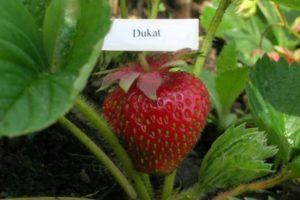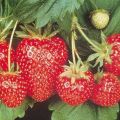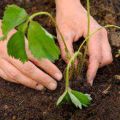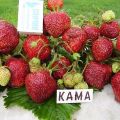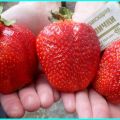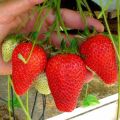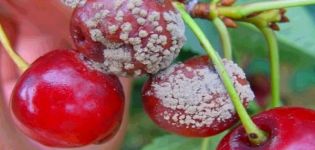Description and characteristics of the Irma strawberry variety, cultivation and reproduction
Irma repair strawberry is distinguished by characteristics that allow growing crops in any region. To obtain a harvest, complex care methods are not required, the culture is quickly assimilated at a new place of growth and allows you to get berries in the first year after planting in the ground.
Irma variety description
The variety was bred by Italian breeders, in our area it appeared relatively recently. Belongs to medium early crops, fruiting begins in mid-June. The crop can be harvested throughout the summer.
Fruit
Sweet berries without astringency notes. Fruits belong to dessert and do not contain a lot of calories, which allows the berry to be distinguished as a dietary one. The fruit is large, weighing up to 20 grams, cone-shaped and bright red. The skin is dense, suitable for transportation and storage of crops for a long time. The aroma of the berry is moderate.
Bushes
Irma remontant strawberry has some distinctive features and the following description:
- bush of medium power, upright type;
- the roots of the culture are developed, the leaves are dark green;
- large strawberry leaves;
- tall peduncles;
- flowers are white with a yellow core.
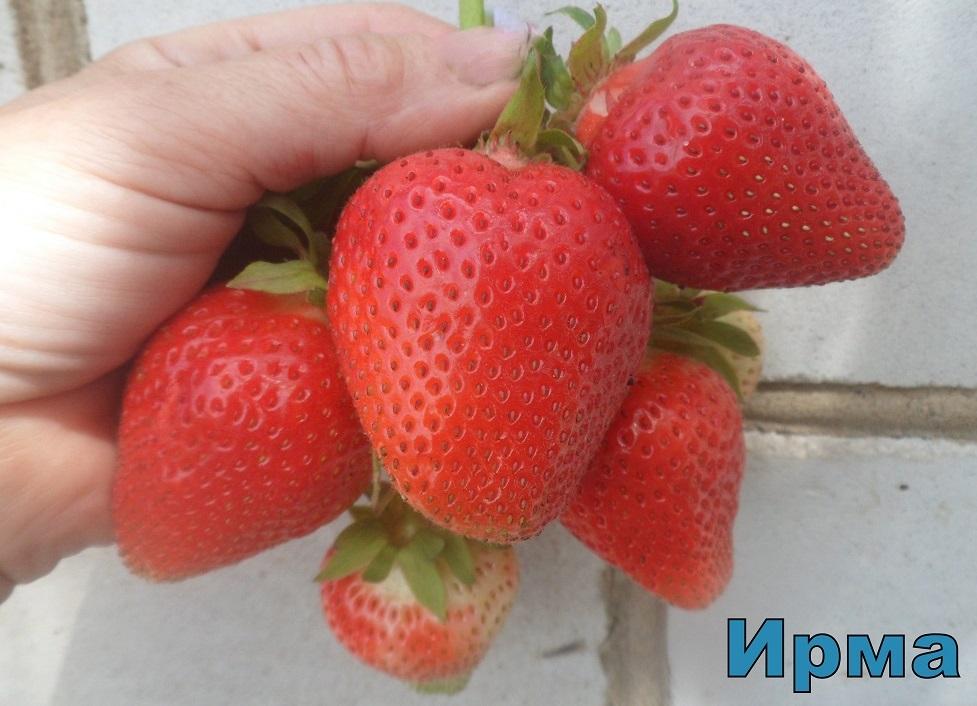
The plant tolerates transplantation well and is immune to many diseases.
Strawberry characteristic
The repair strawberry variety has the following characteristics:
- the plant does not give a large number of whiskers and is of the upright type, which makes the harvesting process comfortable;
- harvesting is carried out throughout the summer;
- in the middle of summer, the taste of berries increases;
- from one bush you can get up to 1 kg of berries;
- the greatest yield can be obtained from a two-year-old plant;
- the berries contain all the necessary vitamins and minerals, including zinc, iodine and vitamin C;
- in mid-August, you can get the largest harvest, in the next month the ripening of berries decreases.
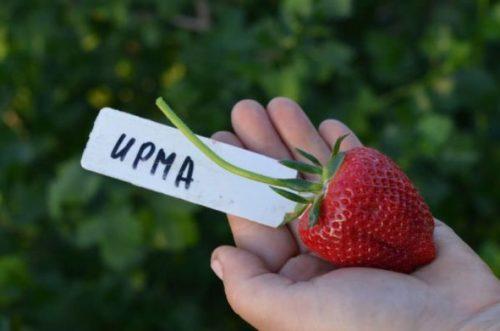
The plant does not require complex care and bears fruit in almost any conditions.
Positive and negative aspects of culture
Culture has the following positive and negative qualities:
| Benefits | disadvantages
|
| Good taste | Excessively hot weather can reduce yields |
| The berries are fleshy, juicy and not baked in hot weather | |
| Large crop yield | The culture prefers a lot of space, since the developed roots are located on the surface and do not tolerate neighboring crops |
| Tolerates heat well | The bush must be repotted regularly |
| Resistant to a wide range of diseases and pests | |
| Can be stored for a long time | |
| Used for preservation and drying |
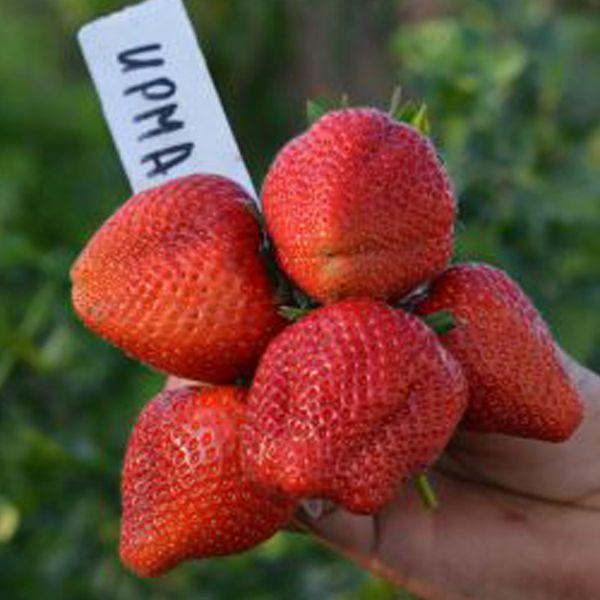
The crop has many advantages, which is why strawberries are grown in many regions.
The nuances of growing
To get a harvest, it is very important to follow the rules for growing a crop. And also timely treat bushes from possible pests.
Planting site selection and soil optimization
The landing site should be sunny, level, without hills, there should be a sufficient amount of moisture in the soil.
Does not tolerate strawberries from nearby trees and bushes such as raspberries and currants.
The soil must meet the following criteria:
- moderate acidity;
- part of the fertile soil layer should consist of humus;
- before planting, the soil must be dug up and fertilized with superphosphates.
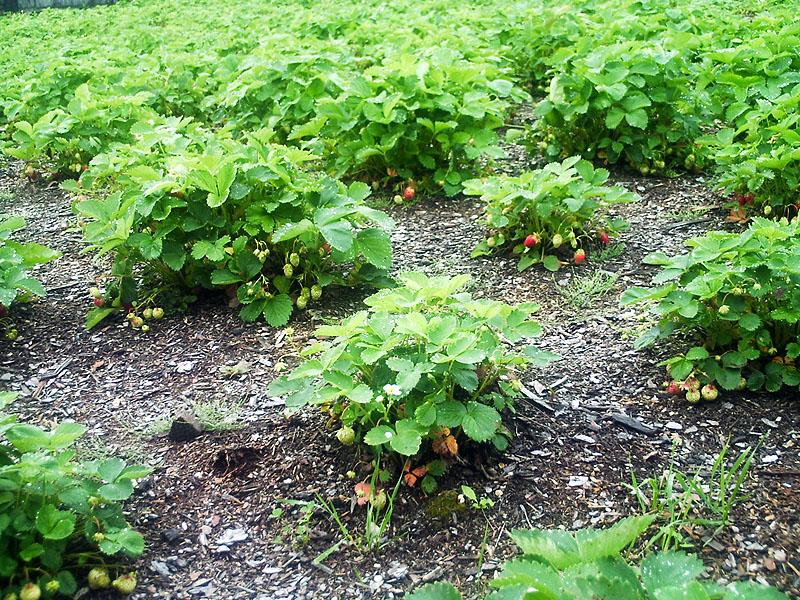
When choosing a place for planting, it is necessary to give preference to the beds on which legumes, onions, and garlic previously grew.
Preparation of planting material
When choosing planting material, the following features must be considered:
- for reproduction, a mother bush is used, on which all inflorescences and fruits are eliminated;
- the outlet must have 3 leaves;
- the kidney should be pink and more than 20 mm in size;
- the roots of the seedling should have a light color, without compaction and damage.
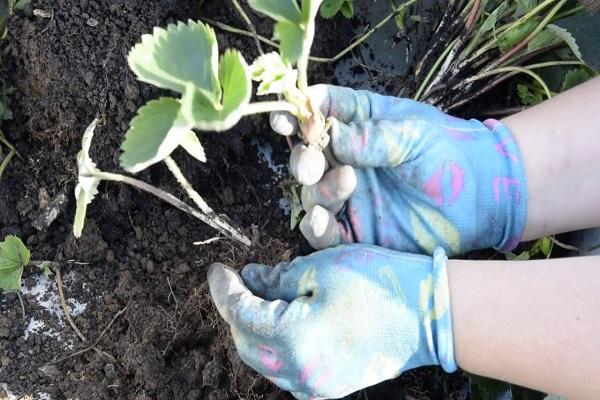
If the cultivation of the crop is carried out using seeds, the container for the seedlings must be prepared in early February. The soil is placed in the container and poured abundantly with water. The seeds are planted in containers and covered with plastic wrap. When seedlings appear, it is necessary to open the greenhouse for half an hour every day, gradually increasing the time for hardening the seedlings. After 3-5 leaves are formed, the seedlings can be planted in open ground.
Landing scheme
To plant strawberries in the ground, the following algorithm of actions must be observed:
- The prepared planting site is fluffed, and all roots are removed.
- Holes are made 20 cm wide and 15 deep.
- The seedling is placed in the hole, while the roots are straightened along the entire depth. The plant is buried in the ground and lightly compacted. The upper kidney remains above the ground.
- The wells are watered abundantly with water and mulched from above with sawdust.

The first inflorescences on the seedlings are removed. The distance between the bushes should be at least 30-40 cm.The distance between the rows is 60 cm.
How to properly care for strawberries
Irma strawberry tolerates various weather conditions, however, like any type of crop, it requires proper care.
Soil and fertilizers
To obtain a harvest in large volumes, you need to take care of the timely application of fertilizers. The soil must be regularly loosened to supply the required amount of oxygen. Weeds must be manually removed to reduce the risk of root damage.
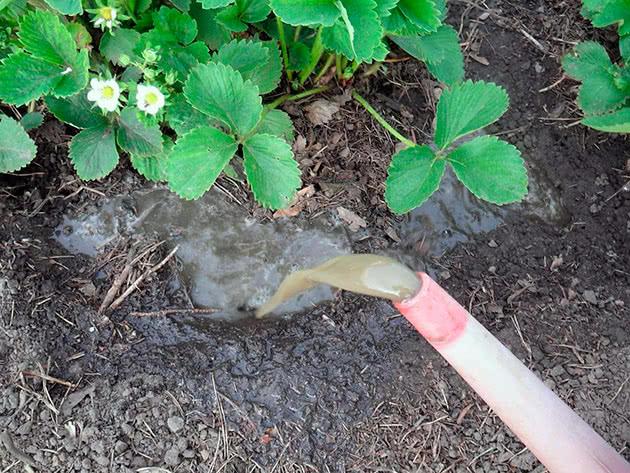
Fertilizers must be used regularly:
- Add wood ash. The substance is mixed with water, and the beds are watered, this method of fertilization will saturate the soil with the necessary components and prevent the appearance of pests.
- Mullein solution can be used prior to ovary formation. For this, 1 kg of the substance must be mixed in 10 liters of water.
- When an ovary appears, it is necessary to treat each bush with nitrogen fertilizer.
Superphosphate can be used, which is applied once a month during watering.
Watering and moisture
Irma strawberry variety requires moderate moisture. In soil that contains a large amount of moisture, the roots of the plant quickly rot. However, in the absence of moisture, the yield will be low and the berries themselves will decrease in size.Watering the plant should be done every 2-3 days in the evening. It is recommended to plow the soil before irrigation. In hot weather, it is recommended to use drip irrigation, which will maintain the required soil moisture level.
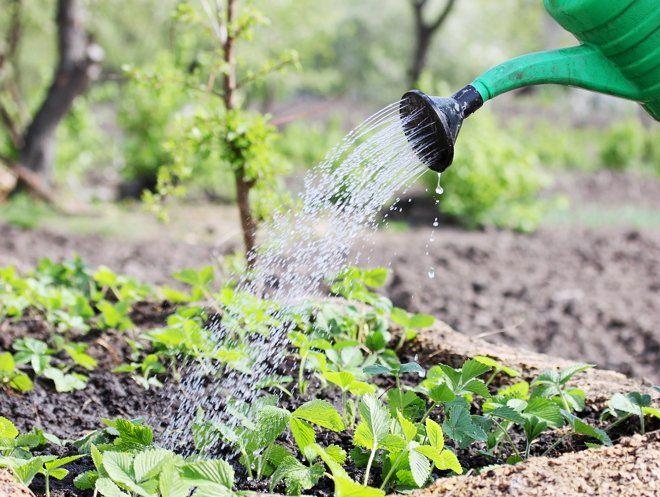
Important. In rainy weather, the berries often crack and lose their presentation, but this does not affect the taste, and such a berry can be used for food.
Mulching
Sawdust mixed with peat can be used for mulching. This mixture will retain moisture and reduce weed formation. The mulch layer is renewed every 2 weeks, this will reduce the risk of diseases and pests. Also, in the process of mulching, brown leaves and damaged shoots are removed.
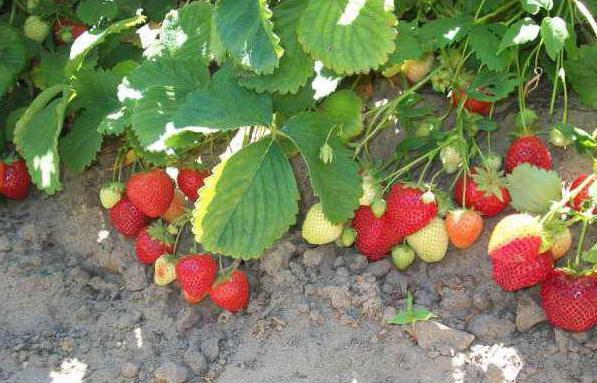
Relation to temperature
Strawberries tolerate low temperatures, however, in areas with severe frosts and lack of snow, it is necessary to cover the plant with an additional layer of mulch from humus and sawdust.
Pests, diseases and prevention
The gardener must be aware of possible diseases of the culture and take the necessary measures in a timely manner.
Strawberries are prone to the following diseases:
- Powdery mildew - appears as white spots on leaves and shoots. Used drugs "Baktofit", "Pharmayod". The plant is sprayed every 10 days.
- Rot - affects the berries, which are covered with a gray bloom. Unripe fruits become watery. For treatment, drugs "Fitosporin", "Alirin" are used. The solutions are sprayed onto the bushes immediately after the color falls.
- Mold - manifests itself in the area of root placement. For elimination it is necessary to thoroughly loosen the soil and treat it with Trichodermin.
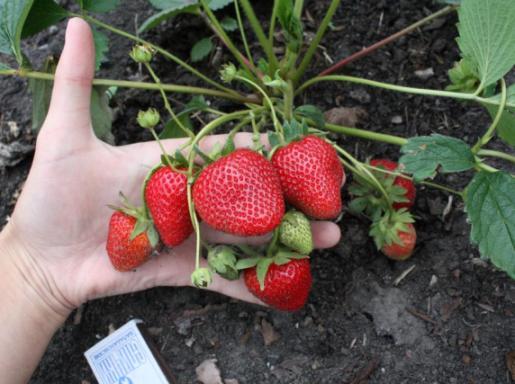
Among the pests, it should be noted:
- Aphids that infect leaves and young shoots and kill the plant. To eliminate the pest, a soap solution is used.
- Whitefly - can be seen on the back of the leaves. To eliminate the pest, you must use "Aktara" or "Aktellik". Divorced according to the instructions.
To reduce the risk of disease, it is necessary to regularly inspect the bushes for damaged leaves. The damaged areas of the bush are removed.
Reproduction
Irma variety reproduces in several ways:
- With a mustache. It is necessary to highlight the bushes that will act as mothers. The mustaches from the bushes are fixed in the soil, after which they put down roots. Formed rosettes are used as planting material.
- Seeds. To obtain seeds, a ripe berry is taken and converted into gruel with a fork. The gruel is left to dry. Then the mixture is washed and the resulting seeds are dried.
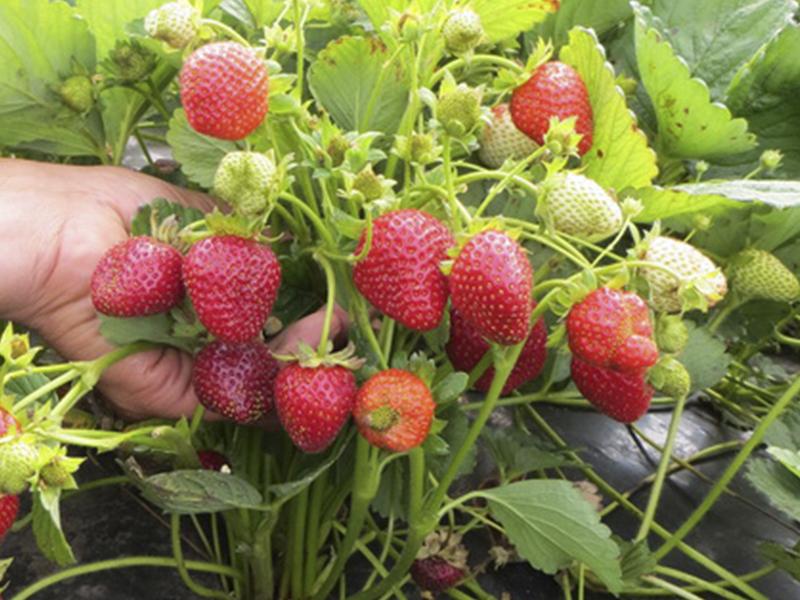
Whisker reproduction is often used, as planting in this way allows harvesting in the first year after planting.
Possible growing difficulties
Strawberries quickly adapt to a new place after planting, observing proper care allows you to get a harvest. However, unforeseen situations may arise, which should include:
- When grown in one place, the berries become small. In such a situation, it is necessary to transplant the culture.
- The bushes bloom profusely, but there are no berries. This means that there is not enough pollination. The plant must be sprayed with anise oil to attract the bees.
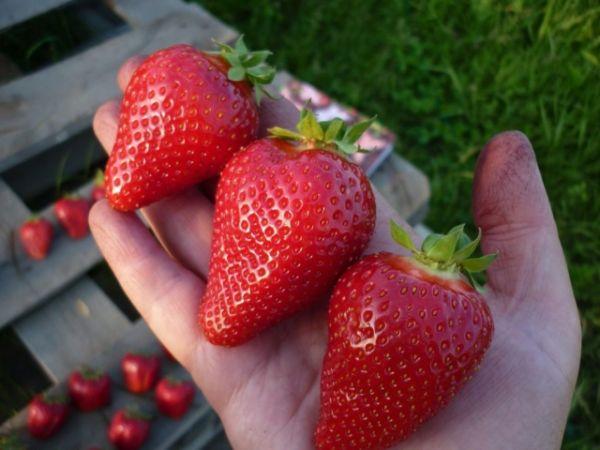
With regular care and timely fertilization, difficulties in growing crops do not arise.
Cleaning and storage rules for strawberries
The first crop appears in mid-June. The berries must be harvested every 2-3 days, otherwise new ovaries will not form. The collected berries are placed in a wooden box in a thin layer. The harvested crop should not be stored in bags or plastic containers. The harvested berries can be stored in a cool place for up to 5 days.
Harvesting can be carried out before the first frost.If there are unripe fruits, you need to cover the bushes with foil to prevent damage to the crop by low temperatures.
Strawberries are a favorite berry of many people. Proper care allows you to grow Irma without difficulties and harvest throughout the summer. The berries are used for preparations for the winter, as well as fresh dessert.
